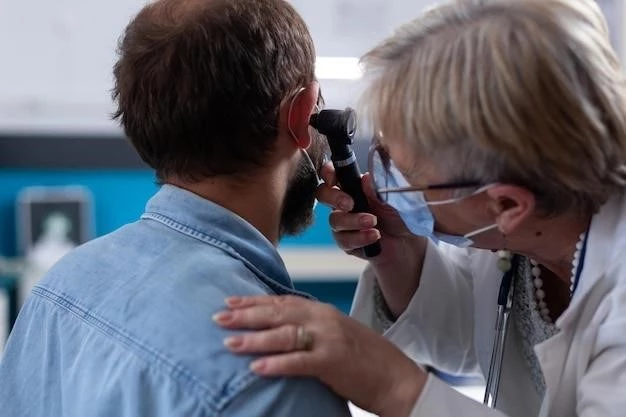Disease ⎯ Macrothrombocytopenia progressive deafness
This article will explore the rare genetic disorder known as Macrothrombocytopenia progressive deafness. It will cover the causes, symptoms, diagnosis, treatment, impact on individuals, and research prospects related to this medical condition. Stay tuned for in-depth information!

Introduction
Macrothrombocytopenia progressive deafness is a rare genetic disorder characterized by the combination of large platelets in the blood and progressive hearing loss. This inherited condition is caused by a genetic mutation affecting platelet production and the function of the inner ear. Individuals with this disorder typically present with a range of symptoms, including early-onset hearing loss and a blood disorder that may lead to excessive bleeding.
Due to its rarity and the complexity of its symptoms, Macrothrombocytopenia progressive deafness poses diagnostic challenges to healthcare providers. The treatment for this condition focuses on managing both the blood disorder and hearing impairment to improve the quality of life for affected individuals. Ongoing research in the field aims to further understand the underlying mechanisms of the disorder and develop more targeted therapies to address its progressive nature.
Understanding the Medical Condition
Macrothrombocytopenia progressive deafness is a complex genetic disorder that affects both the blood and the auditory system. The condition is characterized by abnormally large platelets in the blood, which can impact clotting functions, leading to bleeding issues. In addition to the blood disorder, individuals with this condition experience progressive hearing loss due to abnormalities in the inner ear.
The genetic mutation responsible for Macrothrombocytopenia progressive deafness disrupts the normal processes involved in platelet production and maintenance, as well as the function of the cochlea in the ear. This combination of blood and ear impairments sets this disorder apart from more common conditions and requires a specialized approach to diagnosis and management.
Understanding the underlying genetic mechanisms of this condition is crucial for developing targeted treatments that can address both the blood disorder and the hearing loss. Advances in genetic research have shed light on the pathophysiology of Macrothrombocytopenia progressive deafness, paving the way for potential therapeutic interventions that could improve outcomes for individuals affected by this rare disorder.
Causes and Symptoms
Macrothrombocytopenia progressive deafness is primarily caused by an inherited genetic mutation that affects platelet formation and inner ear function. The mutation leads to the production of large platelets in the blood, which can impair the clotting process and result in a blood disorder characterized by increased bleeding tendencies.
Individuals with this condition also experience progressive hearing loss due to abnormalities in the cochlea and auditory nerves. The early-onset hearing impairment is a hallmark symptom of Macrothrombocytopenia progressive deafness, often manifesting before other symptoms become apparent.
Other common symptoms of this disorder may include easy bruising, nosebleeds, prolonged bleeding after minor injuries, and a tendency to develop hemorrhages in various parts of the body. The combination of blood-related symptoms and hearing loss distinguishes Macrothrombocytopenia progressive deafness from other genetic conditions, making it essential for healthcare providers to recognize and properly diagnose this rare medical condition.
Diagnosis and Treatment
Diagnosing Macrothrombocytopenia progressive deafness involves a combination of clinical evaluations, genetic testing, and specialized imaging studies. Healthcare providers may conduct blood tests to assess platelet morphology and function, as well as genetic screenings to identify the specific mutation responsible for the disorder. Imaging studies, such as MRI scans of the inner ear, can help confirm the presence of structural abnormalities associated with the hearing loss.
Once diagnosed, the treatment approach for Macrothrombocytopenia progressive deafness aims to manage both the blood disorder and the progressive hearing impairment. Medical interventions may include platelet transfusions to address bleeding tendencies, medications to support platelet function, and strategies to improve auditory function, such as hearing aids or cochlear implants.
Regular monitoring by a multidisciplinary team of healthcare professionals, including hematologists, geneticists, and audiologists, is crucial to ensure comprehensive care for individuals with this complex condition. Ongoing research into potential targeted therapies and surgical interventions offers hope for improved outcomes and quality of life for those affected by Macrothrombocytopenia progressive deafness.
Impact on Individuals
Macrothrombocytopenia progressive deafness can have a significant impact on the lives of affected individuals. The combination of a rare blood disorder and progressive hearing loss presents unique challenges that can affect daily functioning and overall quality of life.
Individuals with this condition may face challenges related to communication, social interactions, and educational or occupational pursuits due to the progressive nature of their hearing impairment. The blood disorder component may require ongoing medical interventions and monitoring to prevent and manage bleeding episodes, adding another layer of complexity to the care regimen.
Psychosocial support and access to specialized healthcare services are essential for individuals living with Macrothrombocytopenia progressive deafness to help them navigate the physical, emotional, and practical implications of the condition. Family members and caregivers also play a crucial role in providing support and assistance to individuals affected by this rare genetic disorder.
By raising awareness, promoting research initiatives, and improving access to comprehensive care, the impact of Macrothrombocytopenia progressive deafness on individuals can be better understood and addressed, ultimately enhancing the well-being and quality of life for those living with this challenging medical condition.
Research and Future Prospects
Research into Macrothrombocytopenia progressive deafness is ongoing, with a focus on understanding the underlying genetic mechanisms, exploring potential treatment options, and improving diagnostic approaches for this rare genetic disorder. Advances in genetic sequencing technologies have facilitated the identification of specific gene mutations associated with the condition, providing valuable insights into its pathophysiology.
Future prospects for individuals affected by Macrothrombocytopenia progressive deafness include the development of targeted therapies that can address the unique combination of blood disorder and progressive hearing loss. Researchers are exploring innovative treatment modalities, including gene therapy approaches, to correct genetic defects and restore normal platelet function and auditory capabilities.
Collaborative efforts between healthcare professionals, researchers, advocacy groups, and affected individuals are essential to drive progress in the field of Macrothrombocytopenia progressive deafness. By fostering partnerships and supporting multidisciplinary research initiatives, the potential for improved outcomes and enhanced quality of life for individuals with this challenging medical condition is within reach.
Ultimately, the integration of cutting-edge research findings, personalized treatment strategies, and enhanced support networks holds promise for a brighter future for individuals living with Macrothrombocytopenia progressive deafness, offering hope for more effective management and potential cures in the years to come.
